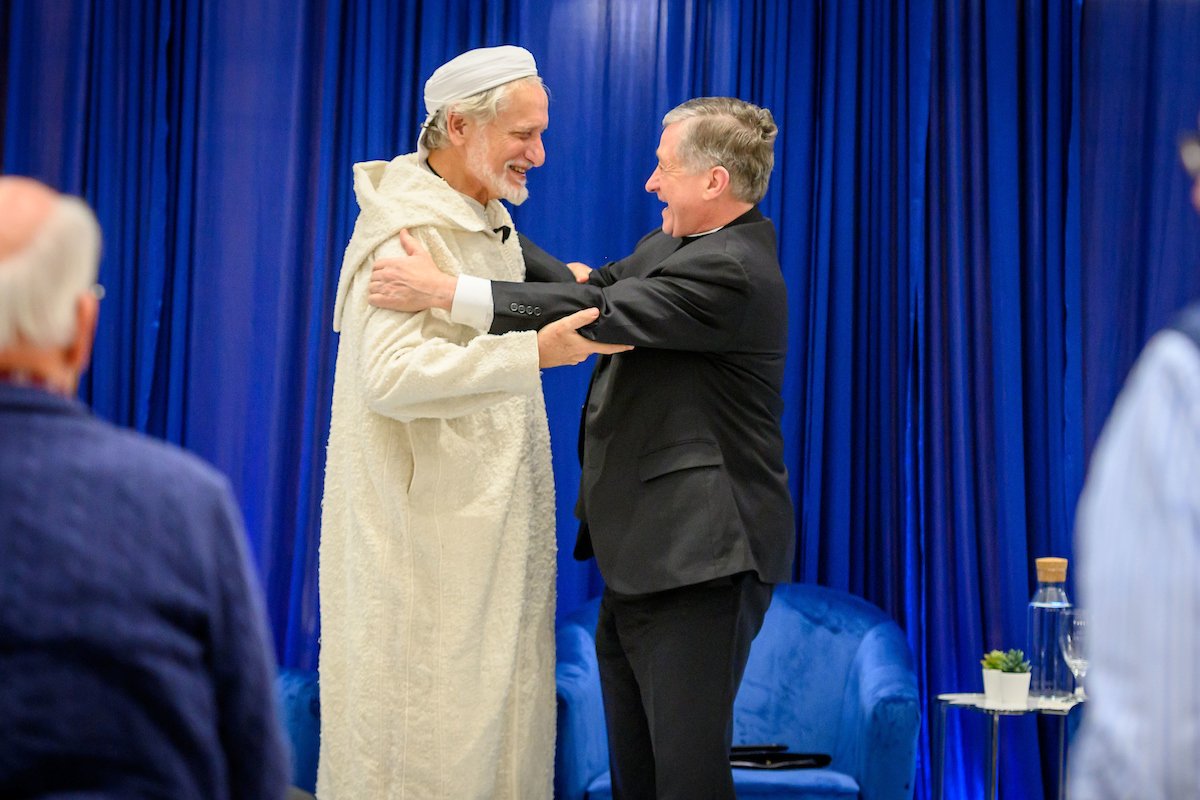Updated
Morocco’s Influence on One American Islamic Scholar – Ambassador Edward M. Gabriel (ret.)

American Islamic College (AIC) President, Daoud S. Casewit and Cardinal Blase J. Cupich at the University of Notre Dame Photo: American Islamic College
Ambassador Edward M. Gabriel (ret.)
December 16, 2019
 Daoud Casewit is a one-of-a-kind individual. Originally from Colorado, and the son of an author of mountain sports and travel books, he converted to Islam in Morocco in 1977. It was also in Morocco that he met his American wife, Fatima, and began to study Arabic with a focus on the recitation of the Quran and the Maliki teachings of Islam. In 1980 the couple moved to Egypt where he earned degrees in Arabic Language and Linguistics from the American University in Cairo.
Daoud Casewit is a one-of-a-kind individual. Originally from Colorado, and the son of an author of mountain sports and travel books, he converted to Islam in Morocco in 1977. It was also in Morocco that he met his American wife, Fatima, and began to study Arabic with a focus on the recitation of the Quran and the Maliki teachings of Islam. In 1980 the couple moved to Egypt where he earned degrees in Arabic Language and Linguistics from the American University in Cairo.
Following his studies in Egypt, they spent the next four years in Madinah (Medina), Saudi Arabia where both taught English at the university. It was during this period that Daoud gained a deep knowledge of the history and geography of the Prophet’s City, Madinah. They then returned to their beloved Morocco.
Over the following two decades, Daoud served as Director of the Arabic Language Institute in Fez the binational United States Fulbright Commission in Morocco. During that time, he and his wife, Fatima, raised four children, who all fluently speak the Moroccan dialect of Arabic, Darija. Two of his children are now Islamic scholars, after graduating from Yale and Harvard, another is involved in international development work and their only daughter owns her own travel business in Buenos Aries, with a focus on the Arab world.
Now back home in America, Daoud has become the head of American Islamic College (AIC), headquartered in Chicago. Its mission is to provide students of all backgrounds a solid liberal arts and sciences education with a rigorous academic program in Islamic Studies, as well as two graduate programs, an MA in Islamic Studies and an MA program in Islamic Chaplaincy.
A frequent participant in the Royal Ramadan lectures held in the presence of King Mohammed VI, Daoud’s most recent event was hosted on November 20th at the Ansari Institute for Global Engagement With Religion, part of Notre Dame University’s Keough School of Global Affairs. He shared the stage with Catholic Cardinal Cupich. In his opening remarks, Cardinal Cupich noted that “like the meeting of St. Francis and the Sultan al-Kamil, this discussion comes at a time when some people see a global conflict between Islam and the West.”
The encounter of St. Francis has been written about in this website before. The first article in August, 2018, detailed the history of St. Francis of Assisi joining the Fifth Crusade in 1219, not to go to war with Muslims, but rather to evangelize with the aim of bringing a senseless conflict to an end. A dialogue ensued between St. Francis and Sultan Malek al-Kamil – the Kurdish ruler and the fourth Ayyubid sultan of Egypt – that lasted nearly a month, and which can be described as the start of a religious dialogue among these two Abrahamic religions.
The second time the encounter of St. Francis’s and Sultan Malik al-Kamil was published in these pages was in April 2019, following the visit of Pope Francis I to Morocco to meet with King Mohammed VI in yet another important chapter in the tradition of dialogue between the Catholic Church and Muslims.
During the Notre Dame conference, Cardinal Cupich, who is the Catholic co-chair of the National Catholic-Muslim Dialogue of the United States Conference of Catholic Bishops, said the encounter was “a radical witness that our faith traditions must include the desire to get to know the other.”
In his prepared remarks, Mr. Casewit said that while examples of interfaith dialogue and cooperation might be seen as an aberration, the 13th century meeting was much more of an aberration for Francis than for al-Kamil, who has been seen as a just ruler to the mostly Coptic Christians in Egypt. “It was St. Francis who was crossing the threshold between faith communities, perhaps for the first time,” Casewit said.”
The Cardinal and Casewit not only celebrated the first and maybe the most historic encounter of Islam and the Catholic faith, but discussed and agreed on difficult issues, such as proselytization. Both men agreed that religion can “propose”, but should not “impose” one’s faith upon another. Daoud cited verses from the Koran that people of other religions must be respected, that God intended them to have different religions which might “vie with one another with good deeds”. He encouraged leaders of both religions to engage in joint community projects to build better understanding in our communities.
As it is stated in the announcement by AIC when appointing Daoud as President of AIC, “Casewit brings to AIC extensive experience in the study and teaching of the Arabic language, a deep grounding in traditional Islamic Studies including the recitation of the Qur’an, and years of immersion in Muslim cultures.” Casewit has uniquely lived in, extensively studied and experienced the culture two worlds, one Christian and one Islamic. He is well situated to be the “bridge between the United States and Muslim societies, and a resource for interfaith and intercultural understanding” that we so badly need in America.